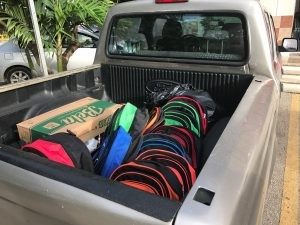by Emily Murphy

Can you fit an archivist in a backpack? With this provocative question, the team at the Community-Driven Archives Project seeks to break down barriers preventing entry into the field of archives. At the root of the question is a simple truth: a budding community archivist doesn’t need all that much to get started — just the right tools.
Community-Driven Archives (CDA) is an ongoing project that began in April 2017, and is currently in its last year of grant funding through the Andrew W. Mellon Foundation. Working under the Southern Historical Collection at the University of North Carolina at Chapel Hill’s Wilson Library, CDA seeks to support historically marginalized communities in sharing and preserving their stories. The program acknowledges the many gaps in the historical record, and strives to empower communities to collect and preserve their own histories rather than imposing the curation of a professional archivist. This model builds sorely-needed trust between communities and the archives. It’s not about creating perfectly processed collections to be locked away in UNC’s vault; it’s about returning that decision-making power to the people. This flexibility allows communities to make the best decisions for themselves and their materials. “It’s a “figure-out-as-you-go”, one foot in front of the other kind of process, collaborating between institutions, communities, and newly-found colleagues,” writes Claire Du Laney, the former Outreach Coordinator for CDA on the project’s blog.

The “Archivist in a Backpack” initiative is one strategy that the project has undertaken: team members put together dozens of backpacks, each containing an archives starter kit, and send them to community archives and grassroots historical organizations all over the country. The kits are specialized for different kinds of archival work, some containing recorders and tripods for collecting oral histories, and some containing scanners for digital preservation. By putting the equipment in backpacks, the archives becomes both accessible and portable — no longer an intimidating, gatekeeping facade. The team at CDA also provides supplementary workshops, webinars, and other assistance to the backpack recipients, but the main tools for success are in the communities’ hands.
Reaching beyond the immediate community of Chapel Hill, CDA has partnered with organizations across the South. This bold, sweeping effort expands the outreach program’s impact and supports the preservation of underrepresented histories all over the region. Community partners include organizations like the Eastern Kentucky African American Migration Project (EKAAMP) and The Historic Black Towns and Settlements Alliance (HBTSA), which seek to preserve historical Black voices and stories. The community partners use the “Archivist in a Backpack” project as a resource in their own activism and preservation activities. The backpacks create new connections between past and present, allowing these organizations to carry on important work such as combating systemic racism and gentrification, preserving the history of the civil rights movement, and returning control of the historical narrative to the community. Many of these community partners are only just getting started, and CDA’s goal is to support them through these formative stages, ultimately creating a network of self-sustaining community archives.
In its “About” page, CDA emphasizes mutually supportive partnerships between professional archivists and communities, with the ultimate goal of “provid[ing] communities with the tools and resources to safeguard and represent their own histories.” By empowering communities to take control of their own historical narratives, CDA and the “Archivist in a Backpack” program turn traditional archiving on its head.
Further reading:
https://library.unc.edu/wilson/shc/community-driven-archives/
https://blogs.lib.unc.edu/shc/2018/10/29/whats-with-all-the-backpacks/
